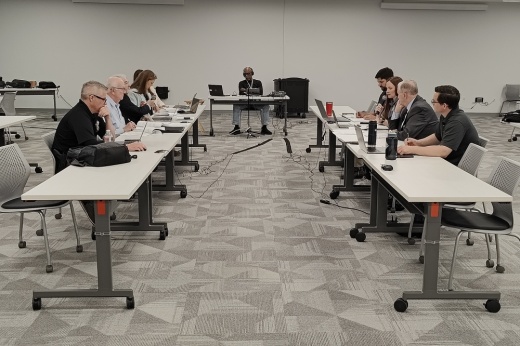The overview
Austin's bargaining with the APA comes as Austin Police Department officers have been working under temporary employment policies since last year.
The previous round of negotiations between the city and police group stretched from 2022 into early 2023, leading to the proposal of a four-year deal with the APA last February. However, City Council never moved to approve that draft document, citing an impending election on a police oversight measure including provisions related to contract issues.
Instead, city officials voted to pursue a limited one-year plan to let the election play out before considering a longer-term deal.
Voters overwhelmingly approved Proposition A, the "Austin Police Oversight Act," last May. City-APA negotiations never started back up, and council eventually signed off on another interim police pay and benefits plan earlier this year.
What's happening
Both sides announced they'd be returning to the negotiating table in March in a stated attempt to stabilize police working conditions and resolve points of contention.
Mayor Kirk Watson called the process a "critical" step for supporting Austin police officers and addressing the APD's hundreds of vacancies, while APA President Michael Bullock said a new contract represents a benefit to all community members.
Contract talks kicked off March 13. Live and recorded labor sessions are available to view here.
Unlike in past meet-and-confer processes, all materials related to any agreement—including a final draft contract—won't be available to the public until a deal is approved by city officials. Instead, only negotiators will have access to that information along the way.
The new policy came at the request of the APA based on a section of state law limiting access to public records in such proceedings. Austin's labor team agreed to the change.
"As law enforcement officers, our primary focus is enforcing and complying with the law and insist the city does the same," Bullock said in a statement. "The law exists because it’s recognized that negotiations are extremely dynamic and ever changing. We are trying to successfully negotiate a contract, not cause confusion due the constant state of change work products are in."
City representatives also pressed the APA to avoid contacting City Council or airing out contract affairs in the media and other public forums as the process plays out. APA Bargaining Committee Chair Jessica Garner said the association wants to keep lines to City Hall open.
“To create a restriction on a type of communication that allowed us to even get back in front of one another into this conversation would be basically counter to the momentum we have moving forward," she said.
The specifics
Austin and the APA's meet-and-confer agreements cover topics from officer hiring and training to compensation and benefits.
As expected, the main sticking point between both sides continues to be civilian police oversight in Austin amid the contested rollout of May 2023's Proposition A.
Members of Equity Action, the group that landed the oversight proposition on the ballot, sued city and police officials late last year over claims that they'd slow-walked or blocked voter-approved oversight provisions. That case could be decided later this spring.
City representatives now say any new contract must be drafted in line with the new policies. Meanwhile, APA representatives have said pieces of the Oversight Act aren't legal or workable, and that they wouldn't stand behind a contract with all those provisions.
Areas of disagreement include doubling the statutory limitation for the police chief to decide on officer discipline from 180 days to a full year, and Austin's potential move away from keeping "g-files," or secret personnel files, under Section 143.089(g) of Texas government code.
The city has argued that it must keep g-files under state law despite that policy being rolled back under Proposition A; Equity Action contends g-files aren't mandated after Austinites voted to end the practice. The APA has opposed negotiating around the g-file issue given concerns about officer safety and the union's bargaining position.
Lawyer and lead city negotiator Lowell Denton said resolving Proposition A disputes, such as the outlook for g-files, will mean the difference between reaching a final deal and what he called "an exercise in futility."
Under Proposition A, city officials must determine that new meet-and-confer agreements meet current oversight requirements before approval, a fact Denton said the APA team ignored.
“If we are legally prohibited from making an agreement that doesn’t make the g-file public, and legally prohibited from entering into an agreement that doesn’t have the 365-day period for disciplinary action, how can we make an agreement?” he said.
Police association representatives contend that it's not their responsibility to meet Proposition A's mandates, and that they don't intend to finalize a deal in conflict with state law.
“If the city wants a contract, we’re prepared to bargain over any issues. We haven’t said we wouldn’t. What we’re saying is, we’re not bound by [Proposition] A. In fact, large parts of A are seriously questionable, and some are in court now; we’ll see what happens," said Ron DeLord, a lawyer representing the association. "There’s nothing in [Proposition] A makes us preempt [the law], no more than if we passed an ordinance, it said, ‘The city will agree to X.'"
What's next
Before adjourning March 13, Denton said the city will work with the APA to schedule further sessions and that his team awaits a counterproposal from the union.





